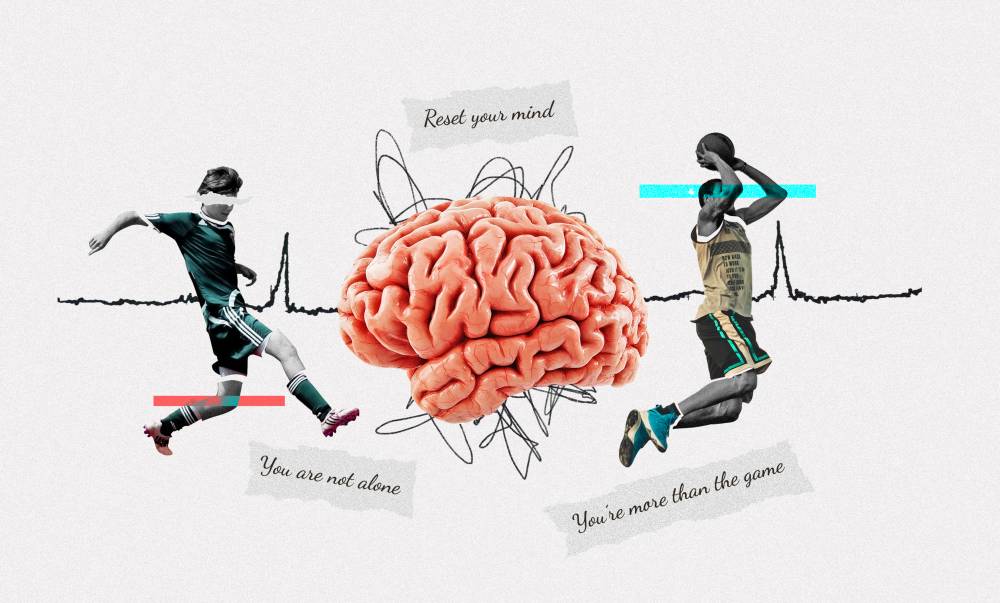3 mental health tips from NBA psychologists

June, the designated Men’s Mental Health Month, is already in the rear-view mirror, but there’s no reason why we shouldn’t always be aware of not just men’s mental wellness, but every athlete’s all year round.
Playing sports, especially at or close to the professional level, can be as nerve-wracking as it is fun and enjoyable. The past decade has alerted more fans to the mental health challenges that athletes face, which have generally been buried by glory, money, and performance-related punditry.
The NBA itself has been pouring in more effort to shore up pro ballers’ mental health, especially after superstars such as DeMar Derozan, Kevin Love, and Jimmy Butler have gone public about the pitfalls of anxiety and depression they’ve each faced at various points in their lives. In 2019, the league finally decreed that all teams must have a mental health professional employed, leading to the NBA’s official Mind Health program.
On a slightly different note, popular American TV series “Ted Lasso” also brought this idea to the forefront by heavily featuring a sports psychologist character and her work in the second season.
As a result, there’s now a wealth of sound mental health advice that applies not just to basketball players but also to any athlete competing on any level, especially in competitive and organized play. A few years back, “Men’s Health” put together a useful roundup of tips for everyone dealing with sports and career-related issues—here are the best ones:
Find your emotional baseline and find your way back to it
Poor performance on the court, field, ring, or wherever you play can lead to negative feelings or even depression. While it’s perfectly normal to feel bad after losing or not doing well, you shouldn’t let it derail the rest of your season or career.
“It’s important to know your happy medium, what I call your ‘baseline,’” says Chantelle Green, Ph.D., director of Mind Health and Wellness for the Portland Trail Blazers. “When you’re feeling below that baseline, it can be hard to stay motivated.”
To find your emotional baseline, figure out when you are feeling your best self: when you have mental clarity, peace of mind, and happiness. When you feel too bad (or even too good), you need to do things that get you back to that baseline, whether it’s self-care, spending time with your loved ones, meditating, or simply doing the things you love. The more tools you have in your mental bag, the better.
And when you’re feeling unmotivated because you’re not at your baseline and you’re not performing well, you’ll also need to figure out things that can get your spark back. It could be winning a big tournament, making the postseason, or something more grounded such as being healthy or happy. You’re also responsible for your own motivation, and it doesn’t have to be big, lofty goals all the time.
Stay in the moment when you’re feeling anxious
One of the biggest and most common challenges any athlete goes through is crippling anxiety, with so many possibilities and probabilities unfolding at any point of time in one’s career. This is the one I relate to the most, thanks to the constant fear of messing up that I’ve since learned to largely silence.
“I try to help players see that anxiety takes place in a futuristic world; the moment you’re anxious about has yet to occur,” says Corey Yeager, Ph.D., a psychotherapist and author who works with the Detroit Pistons. “You are spinning your wheels on something that isn’t real, burning your energy about something that may never happen.”
The important tip here is to be present in the game and not think about what hasn’t happened, and what may never happen.
“So I tell [players] to stay in the current moment, not to engage in futuristic thinking,” says Yeager. “When you step to the line, go through the routine. Do your breathing. If you have a saying, say it. Center yourself, then shoot the free throw like you’ve done a million times before. We know that we can control how we act and react in this moment. We won’t be as concerned or worried about what is coming. That’s liberation from anxiety.”
Learn to accept the role you’re given, even if it doesn’t align with your expectations
For athletes in team sports, the reality of playing in a system you join may not always align with the dreams and expectations you have in your head. You might think you’re going to be the star player, but your coach may have other ideas, slotting you in a role that’s smaller than you thought you were going to get.
While some athletes’ egos may not be able to handle that, the interesting thing about such a reality is that working with the role you get may be the best opportunity to move closer to the stardom you’re chasing.
“If you don’t take advantage of the opportunity you’re given, you may regret it for a long time,” says Joe Carella, Psy.D., a sports psychology consultant for the Orlando Magic.
“Unfortunately, the guys who don’t develop greater self-awareness are more likely to resist change, and their NBA careers are shorter and don’t match their potential,” he observes. “But the players who find a way to be dependable while embracing the challenge of changing perceptions are the ones with long, fulfilling careers.”
If this is you as an athlete in a team or system, it means you’re going to need to learn some humility and work hard while accepting that you may not be the person to carry your team. Some people accept that and flourish, while others struggle with it and crash—it’s up to you to decide what kind of athlete you’re going to be.

















